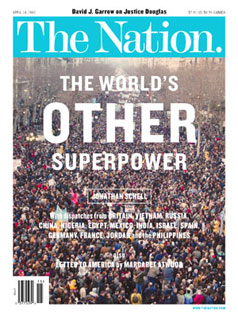On White Preferences
The Supreme Court will hear oral arguments in the University of Michigan affirmative action cases on April 1.

Print Magazine
Purchase Current Issue or Login to Download the PDF of this Issue Download the PDF of this Issue
The Supreme Court will hear oral arguments in the University of Michigan affirmative action cases on April 1.
Not since Jimmy Carter's confession that he had lusted in his heart after women other than his wife have Americans been so interested in the religious life of the man occupy...
Spring officially began on Thursday, March 20, but the first real spring day in Washington was Saturday, a blindingly sunny day, flowers just beginning to peek out, the Nati...
Many pundits predicted that the peace movement would dry up once war began, and indeed polls show that American support for the war rose to as high as 71 percent after its l...
I'm standing at the northern front in Chamchamal, a quarter-mile from Saddam Hussein's hilltop divisions. Before me six mounds of earth, like oversized anthills, line the ri...
The fierce tableau of smoke and flames that US bombs created over Baghdad--a visual message of America's awesomely destructive power--brought to mind Shelley's meditation on...
Recently, Nilas Martins, principal dancer at the New York City Ballet, was stopped in Washington, DC, by gun-wielding policemen.
Suddenly the sky is dark with chickens coming home to roost, and bedtime reading is Thucydides' account of the disastrous Athenian siege of Syracuse.
On April 1 the Supreme Court will hear oral arguments in the University of Michigan affirmative action cases on whether to overturn the 1978 Bakke decision and ban cons...
As student antiwar activists work to make their case against war persuasive to ambivalent classmates, the leaders of a Stanford University peace group have launched a differen...
The Spanish capital took on the air of a battle zone the weekend after the war began, as antiwar protesters clashed with riot police throughout the city.
Dear America:
This is a difficult letter to write, because I'm no longer sure who you are. Some of you may be having the same trouble.
I came across a sign the other day, inelegantly scrawled on cardboard and stuck to a telephone pole. It read Fuck Bush.
"We have come to give flowers instead of missiles," a flower producer repeated, as he gave roses to the passers-by in the main square of Mexico City on Friday morning, hours...
The Indian public has long been suspicious of the US arguments for military action against Iraq and the legitimacy of any "regime change" executed by a superpower with imper...
The gym is the last place to look for an impassioned discussion of global politics in Nigeria, a country that is currently pre-occupied with gasoline scarcity, rising politi...
My neighbor, who like many Egyptians prefers not to see his name in print, asked me about my nationality the morning the war broke out. "French?" he inquired hopefully. Amer...
The shockingly awful Anglo-American invasion of Iraq means that Jordan is now literally situated between two wars: To the west, the increasingly bloody Israeli-Palestinian c...
As I was driving home from work late Wednesday night, it became clear that the assault would begin within hours.
The pedicab driver stretched out in the passenger seat, his legs thrown over the bicycle seat, half dozing and half listening to the latest news updates in the hours after A...
Following the first attack at 3 am French time, the morning papers were ready with generic "War Is Here" headlines, accompanied by full-page images of dark skies.
A few hours after the United States launched its first missile attack against Baghdad, I spoke to 400 students and faculty at Moscow's largest university of commerce and eco...
In this country, where a US military attack echoes more loudly perhaps than anywhere else in the world, protesters against the war are expressing themselves from Hanoi in th...
The night the war began, an ashen-faced woman in Parliament Square held up a photograph of an Iraqi soldier, reduced to a smudge of carbon but for his head and feet--an imag...
Richard Sennett is best known in the United States for his 1972 book (written with Jonathan Cobb), The Hidden Injuries of Class. That study of white working-class men...
Someone once described Graham Greene as the novelist of decolonizing Britain.
Clear eminence without whom I would be
nothing oh great provision never seen
barely acknowledged even wished away